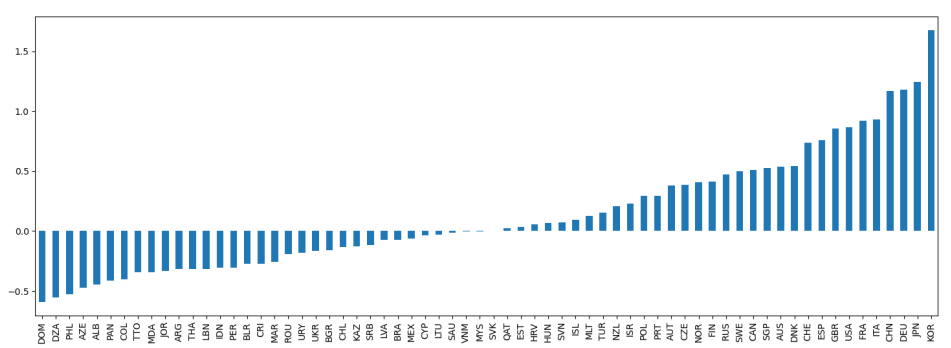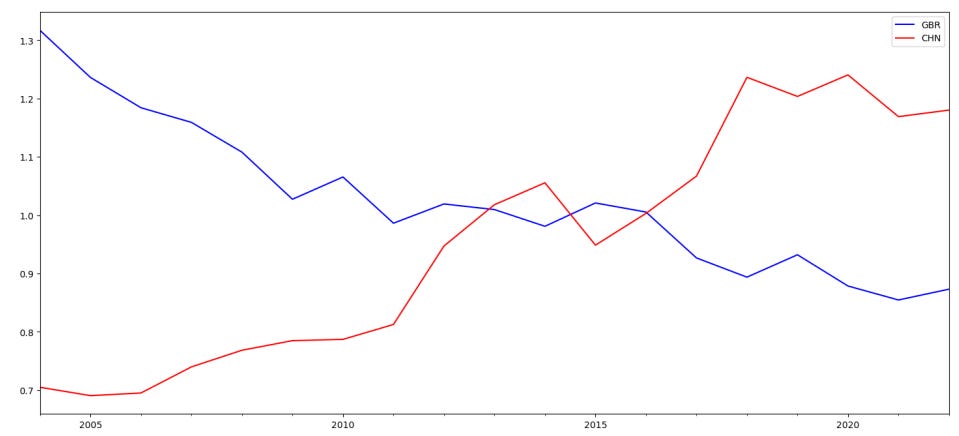
Soft power is such an ephemeral concept that so far nobody has even tried to quantify it. Most people agree that soft power is the kind of influence a country has internationally and geopolitically that is not derived from its economic or military power. Rather it is derived from other countries trying to emulate their lifestyle, culture, etc. But how do you measure that?
Serhan Cevik from the IMF and Tales Padilha from the University of Oxford gave it a shot and created a geopolitical soft power index formed from six dimensions. For each dimension they examined a range of indicators and then used principal component analysis to find the optimal weighting between these indicators:
-
Commercial prowess: Driven mostly by the number of patents filed in a country and a country’s outward investments
-
Culture, which was 74% weighted to the number of UNESCO World Heritage Sites and 26% weighted to cultural exports like films, music, etc.
-
Digital footprint which was almost perfectly 50/50 split between the number of mobile phones per capita in a country and the share of households with internet access.
-
Educational quality was mostly driven by the results of the PISA tests for students and the number and influence of academic articles published by local scientists.
-
Global reach was essentially driven by the number of embassies a country maintains abroad and the number of migrants from a country that have moved abroad.
-
The quality of institutions, the rule of law, etc.
The chart below shows the most recent soft power index readings for 66 countries. The list is topped by South Korea (1.68) followed by Japan (1.22). What surprised me was that the US wasn’t even in the top five and that countries like Germany, China, France, and Italy have higher soft power than the US. To be honest, I would never have put South Korea on top, but then again, countries like South Korea regularly punch above their weight in terms of cultural exports and academic influence as well as digital footprint.
Soft power across 66 countries
Source: Cevik and Padilha (2024)
What is also interesting to see is the change of soft power over time. The chart below compares the UK with China. We all know that China’s influence in the world has increased, not just in economic terms but also culturally and in the online world. But what the chart shows neatly is the relative decline of the UK.
Soft power of the UK and China
Source: Cevik and Padilha (2024)
As an immigrant living in the UK, I am always surprised find Brits who still think they are an Empire with the same influence they had in the Victorian age. They are ready to admit that the UK is economically smaller, but they still think that culturally and in terms of institutions like the rule of law and quality of education, the UK is at the very peak (or maybe behind the bloody Americans, but that’s it).
Well, nostalgia might give these people a cosy feeling, but the truth is the UK is a small island in the Atlantic with a great history but not all too important in the present (no offense intended).
Yes, it has good schools, but most countries in Europe have secondary education that on average tends to be better than the one in the UK (though they don’t have the same elite universities that the UK has).
And when it comes to cultural exports, they are declining. In the 1960s the US had the British invasion. In the 1970s, the most dominant bands and musicians in the world were Brits (Led Zeppelin, David Bowie, Elton John, Queen,…). British films were watched all over the world and the BBC was the global standard for journalism. Today, the world listens to K-Pop, watches Scandi noir and the internet has killed off quality journalism everywhere.
Interestingly, this might have repercussions in financial markets. In the paper, the authors try their hands at exchange rates and try to find out if soft power influences exchange rates. They find that while soft power overall has little influence, the culture and the global reach sub-components both lead to lower exchange rate fluctuations as more people want to visit a country with higher global reach and cultural power and more countries want to trade with them.









